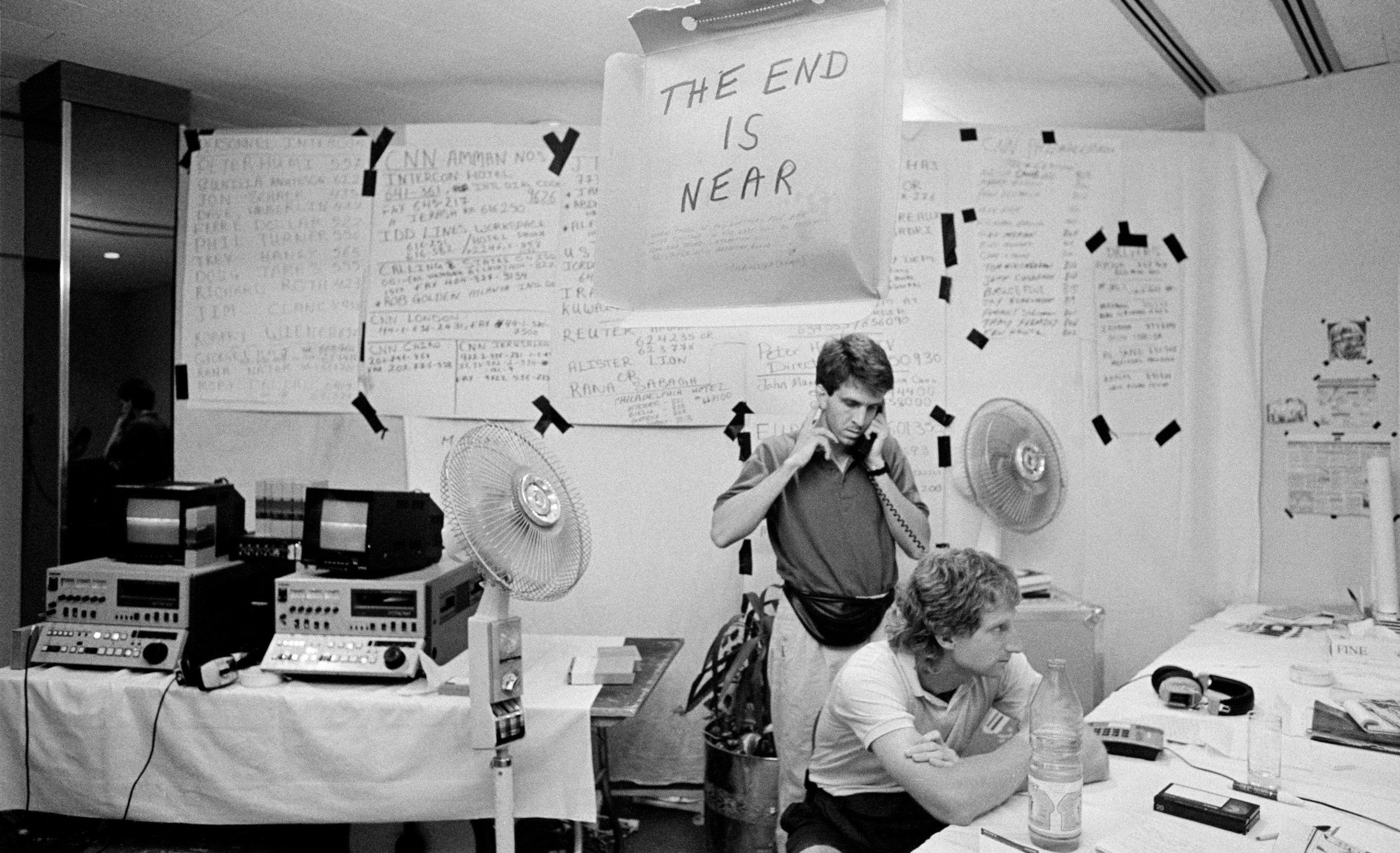Someone told me years ago that as a journalist making documentary work—the kind of work I do—you should leave every interview having fallen a little bit in love with your source. That’s how you’ll know you’ve gotten to a real, human place with them. I can’t count how many strangers I’ve fallen a little bit in love with. It happened in their living rooms, in their offices, sitting in parks, and in impersonal recording studios. I left each of those interviews with a fizzy feeling in my stomach, like my world had just opened up a little bit more. Then I turned that ephemeral glow of our brief relationship into articles, blogs, and podcast episodes, for which I was paid real American dollars. For the most part, I never spoke to those strangers again.
Journalists justify this antisocial behavior by invoking the power of journalism. These emotional dalliances are a necessary part of the job, as if “storytelling” lends the enterprise an inherent moral value. Throughout my career, I’ve had that old Janet Malcolm line offered up in anguished conversations with editors and heated group chat discussions about journalistic ethics: “Every journalist who is not too stupid or too full of himself to notice what is going on knows that what he does is morally indefensible.”
It’s used so often that it’s come to resemble a thought-terminating cliché, trotted out the way upwardly mobile liberals shrug and say “There’s no ethical consumption under capitalism” as they sip Starbucks. It’s an acknowledgement of the brokenness of the system at the same time it absolves individual moral culpability. But pointing out the problem is not fixing it. Maybe it’s because I’ve spent the last two years thinking about what it means to create a commercial product from the raw material of strangers’ lives, but I find myself having a hard time justifying a lot of the work I did earlier in my career.
I thought about those long-forgotten sources when I listened to Radiotopia Presents: Shocking, Heartbreaking, Transformative, hosted, written, and produced by Jess Shane. (Before I proceed, I must share a slew of disclosures: Radiotopia distributes Normal Gossip, the podcast I co-created and produce; I know and like Jess Shane; we produced a podcast together three years ago, which Sara Nics, editor of Shocking, Heartbreaking, Transformative, also edited.)
In the first episode of the podcast, Shane lays out her goal for the project: to create a documentary that bends the traditional roles of journalism with the goal of creating a non-extractive work. She allows her subjects to guide the arcs and themes of their stories. She plays cuts of episodes for them and asks for feedback. She pays her subjects $20 an hour for every moment they spend with her.
There’s a scene in the third episode where one subject, Judy, hears that she has qualified for a housing voucher that will allow her to move back into the apartment she’d shared with her husband before moving into a homeless shelter. This happens, in part, because Shane introduces her to a lawyer friend who gives her advice. Judy offers Shane a brownie, as a token of her gratitude. I can hear how uncomfortable it makes Shane. The last thing she wants is to take a piece of food from this unhoused woman she’s become friends with. They both insist, and at the last minute, Jess’s voice lightens: “Oh but actually Judy, remember, I don't know if you know this but when we talked originally about this documentary I have a budget to pay you for any time you spend with me. So I actually owe you $40.”
I imagine Shane digging in her wallet for two twenties, relieved to have something to offer Judy in this moment when Shane is taking so much from her already—her brownie, yes, but mostly her story. Shane calls it a win-win, but listening to the exchange, I know better.
Paying her subjects was supposed to compensate for the fundamental power imbalance that exists between media maker and subject, but later in the series this setup breaks down. In a meeting convened for the subjects to give feedback on drafts, the subjects hold back, offering effusive praise instead. Later, Shane says, “In the lack of feedback, all I hear is my power in the room.” All three of her subjects are economically insecure, and I assume they don’t want to risk the potential damage to the relationship by being honest. It could jeopardize what is essentially a part-time gig that pays more per hour than at least one of the subjects’ full-time jobs. “To expect anyone to decide how they felt about how they were represented in a documentary right away and in front of the person who made it, the person who's paying you, sounds a bit like when your boss asks you for anonymous feedback,” Shane says. “It feels risky.”
At the end of the fourth episode, Shane gets massive, unexpected feedback: Judy wants her to cut the majority of her episode; she doesn’t like something about how she’s portrayed. We don’t know exactly what Judy wanted cut because Shane ultimately obliges.
Once we learn that the version of the story we heard in the previous episode is the redacted version, the gaps in the story become obvious, and knowing that something contentious is missing makes me feel like I’m not getting the whole story. Janet Malcolm said, “The catastrophe suffered by the subject is no simple matter of an unflattering likeness or a misrepresentation of his views; what pains him, what rankles and sometimes drives him to extremes of vengefulness, is the deception that has been practiced upon him.” In this series, we see this dynamic expressed between documentarian and subject, but we also experience it as listeners. In a project that is willfully supposed to be anchored in truth, it’s unsettling to know that the version of truth we have heard has been manipulated. That discomfort gets to the core of the larger problem with documentary: There is always something missing. Normally, what we never see is the push and pull that went into the final cut; here it’s the lacuna itself, even as our attention is drawn to it by our peek at negotiation between reporter and subject.
Then there is the question of ownership: over stories, over lives, over product. Ernesto, another one of Shane’s subjects, says, “You want me to just say all these crazy things that happened to me, all this experience, and then put it out there, make money, and I get the $20 an hour. And it's hard for me to say that because […] I respect the art. But you know, you kind of made it your thing rather than our thing.”
When the series ended after five episodes, I felt queasy. I thought about the fact that I saw Shane on the schedule for a fancy audio festival earlier this year, in conversation with another accomplished producer about documentary ethics. But what is up with her subjects, Judy, Ernesto, and Michael? What did they get out of this, aside from—presumably—a couple hundred dollars? Was it worth it for them?
Even though she ultimately cedes to Judy’s wishes, the process of getting there requires tense negotiations—with Judy, with her editor, and with Radiotopia executives. It’s clear that even though Shane set out with the best intentions, the process of creating a commercial product with a business like Radiotopia, which, as executive producer Audrey Mardavich says on tape is “not immune to capitalism,” presses on her ethical boundaries in a way that makes her uncomfortable. During one tense phone call, she essentially threatens Judy, saying that because Judy signed a release form, Jess has the legal right to do whatever she wants with the tape.
Creating a narrative from real life requires some element of misdirection. No piece of literature or documentary is a 100 percent faithful encapsulation of reality. In memoir, the author creates a gap between their true identity and the version of themselves depicted on the page. They become a character. Shane did this deliberately in Shocking, Heartbreaking, Transformative. She created an ugly character out of pieces of herself, someone who cares about documentary ethics but who cares more about her personal and professional ambition as an artist. She is the person who comes out looking the worst from this series, which is rarely the intended or typical outcome for any documentary project. She’s an easy target for listeners’ ire and disgust, and that is on purpose.
Shane talks about this in relation to each of her subjects throughout the show—she is shrinking all of their nuance and complexity into tidy archetypes she can depict in 35 minutes or less, and she tells you how she does it. This flattening of truth into character happens everywhere. It happens in true crime podcasts and magazine features and blind items and on sports blogs and even on Normal Gossip. But as I mentioned earlier, pointing out a problem doesn’t solve it, and describing the moral indefensibilities of commercial journalism does not absolve its practitioners.
In 2017, I met with the owner of a podcast production company because I was looking for a job. This company made shows I enjoyed and admired, and I thought they were doing important work for people like me, who didn’t always feel represented in the media. Their Brooklyn office was filled with West Elm furniture and hip-looking people bathed in tons of natural light. The owner gave me a tour of their office and their recording studio, dropping the name of a famous writer who recorded their podcast there. I imagined a version of myself who worked there one day, making podcasts that mattered and becoming friendly with the kinds of people who made up my creative pantheon.
We sat in the owner’s office and talked about podcasts. They told me how there was so much work out there because every company wanted a piece of that Serial pie.
They said, “There’s just so much opportunity to—”
I cut in, thinking we were on the same wavelength.
“—to tell stories,” I said, nodding and smiling.
“No,” they said, furrowing their brow. “So much opportunity to make money.”






